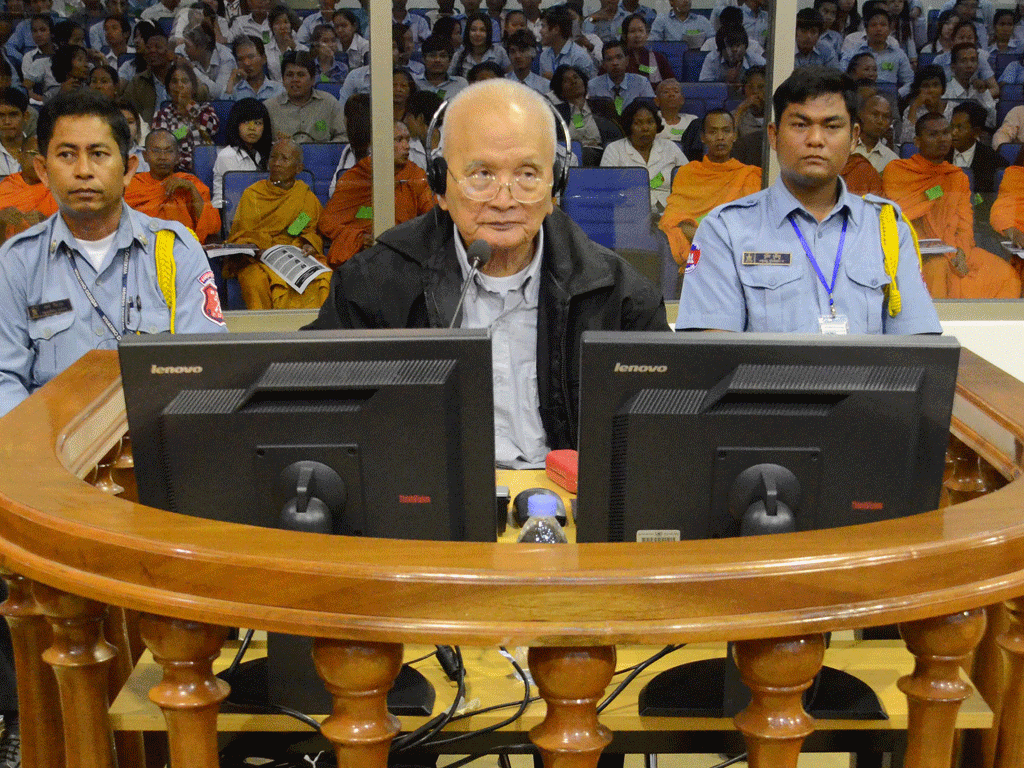We weren't all bad in the Khmer Rouge: Pol Pot's deputy makes his case
'Brother No 2' takes the stand at UN tribunal – and blames Vietnam for massacre of millions

Your support helps us to tell the story
From reproductive rights to climate change to Big Tech, The Independent is on the ground when the story is developing. Whether it's investigating the financials of Elon Musk's pro-Trump PAC or producing our latest documentary, 'The A Word', which shines a light on the American women fighting for reproductive rights, we know how important it is to parse out the facts from the messaging.
At such a critical moment in US history, we need reporters on the ground. Your donation allows us to keep sending journalists to speak to both sides of the story.
The Independent is trusted by Americans across the entire political spectrum. And unlike many other quality news outlets, we choose not to lock Americans out of our reporting and analysis with paywalls. We believe quality journalism should be available to everyone, paid for by those who can afford it.
Your support makes all the difference.Pol Pot's deputy claimed yesterday that he and other senior figures from Cambodia's hated Khmer Rouge were not "bad people", and that they faced being misjudged by history.
Nuon Chea also told a court that Vietnamese troops were responsible for the deaths of up to 1.7 million Cambodians, and not his Maoist-inspired regime.
Frail but defiant, the 85-year-old who once served as the regime's main ideologist took to the stand at the UN-backed tribunal in Phnom Penh for the first time to declare he had devoted his life to serving his country. Hundreds had packed the court to hear him speak.
"I don't want the next generation to misunderstand history. I don't want them to believe the Khmer Rouge are bad people, are criminals," he said. "These war crimes and crimes against humanity were not committed by the Cambodian people. It was the Vietnamese who killed Cambodians." He is one of three elderly men on trial for their roles in the 1975-79 reign of the Khmer Rouge. Estimates have suggested that up to 1.7 million people were either executed or died of starvation or disease as the regime forced people to live in agricultural labour camps.
Nuon Chea, along with Khieu Samphan, 80, the former head of state, and 86-year-old Ieng Sary, the one-time Foreign Minister, are all charged with crimes against humanity, genocide, religious persecution, homicide and torture. They deny the charges and Ieng Sary has indicated he will not co-operate with the tribunal. A fourth senior figure, the Social Affairs Minister Ieng Thirith, was recently declared unfit for trial because she has dementia.
Yesterday's testimony ended early when Nuon Chea twice asked the court to adjourn proceedings, complaining of heart problems and breathlessness. The judge, Nil Nonn, then stopped hearing until later today, but the incident triggered fears among campaigners who say the leaders may try to avoid justice by seeking to have themselves declared unfit for trial.
"All of us are worried about this. For me, it is the main concern," said Ou Virak, a victim of the regime who now heads the Cambodian Centre for Human Rights. "I suspect at least one of them will try. To me, that would be very sad if it happened."
Nuon Chea's attempt to transfer responsibility for what happened to the Vietnamese was expected. The Khmer Rouge leaders have always claimed that the mass graves were the result of actions perpetrated by the Vietnamese after they seized control of Phnom Penh and much of the country in 1979.
Later this week, the court is expected to hear details of the forced evacuation of Phnom Penh by the Khmer Rouge fighters in the spring of 1975. Orders were given that everybody should leave everything but the most basic possessions and walk out of the capital towards camps in the countryside.
Witnesses have told how crowds of people, including the elderly and sick, made their way towards the labour camps. Some of the ill and injured were even pushed in their hospital beds.
Join our commenting forum
Join thought-provoking conversations, follow other Independent readers and see their replies
0Comments